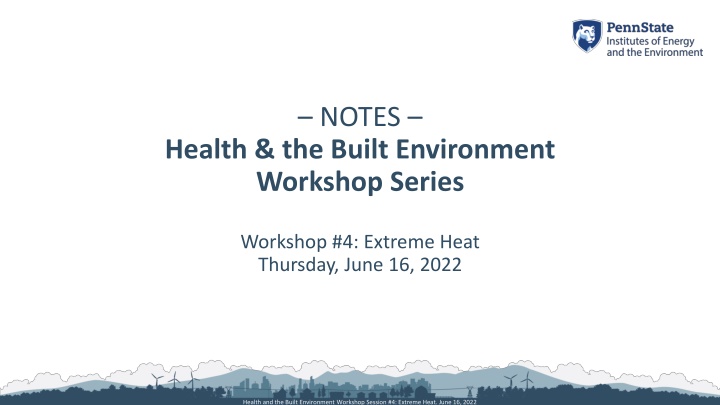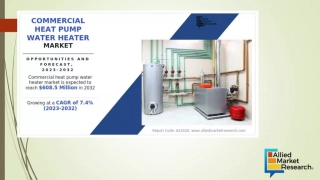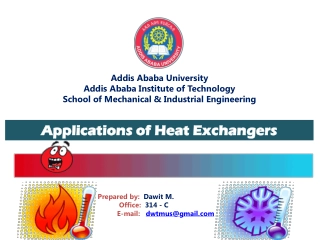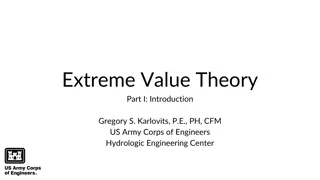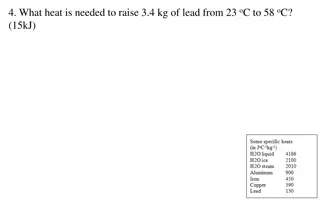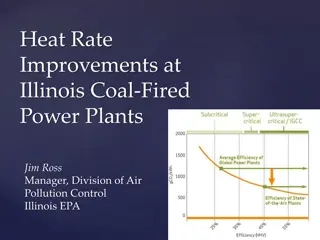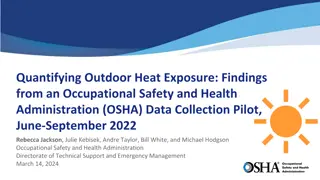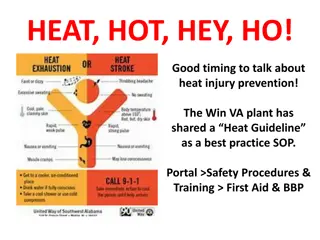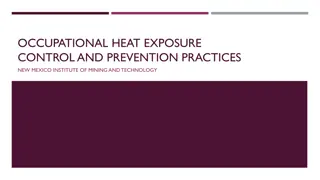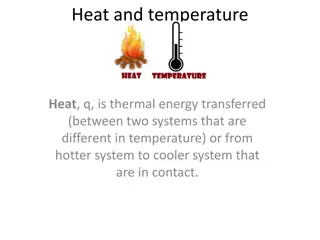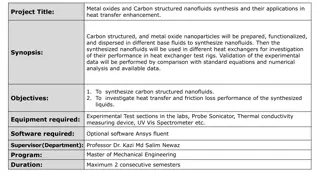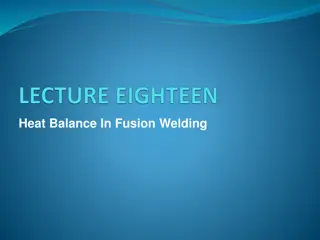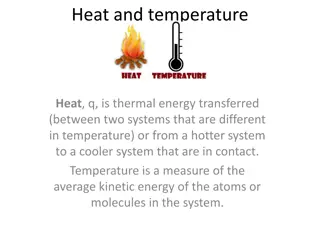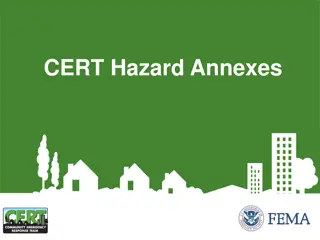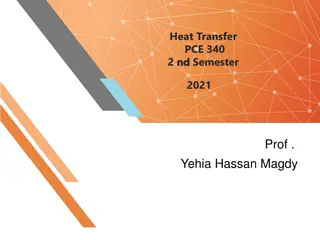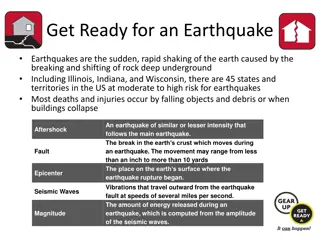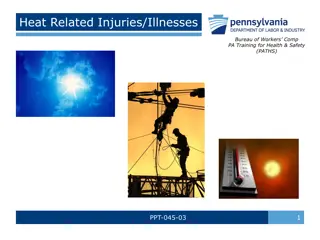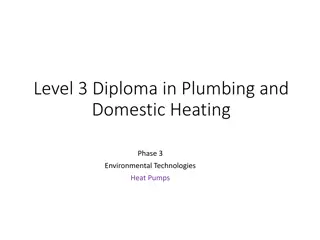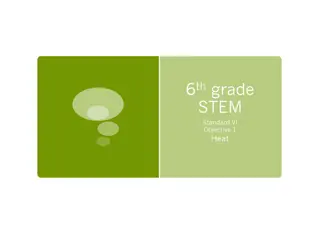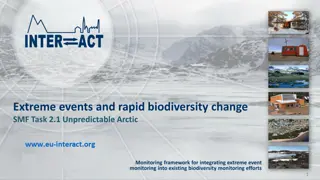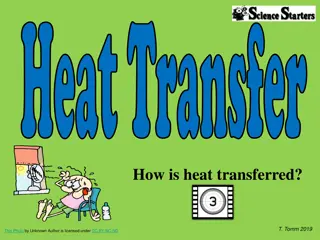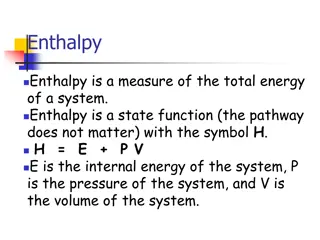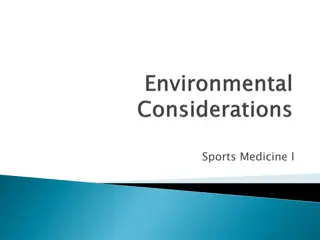Health & Extreme Heat Workshop Insights
Workshop participants discussed funding, expertise, and research questions related to extreme heat in the built environment. Key topics included funding sources, research priorities, and societal impacts. The session highlighted the need for non-electricity-dependent solutions and considerations for environmental justice.
Download Presentation

Please find below an Image/Link to download the presentation.
The content on the website is provided AS IS for your information and personal use only. It may not be sold, licensed, or shared on other websites without obtaining consent from the author.If you encounter any issues during the download, it is possible that the publisher has removed the file from their server.
You are allowed to download the files provided on this website for personal or commercial use, subject to the condition that they are used lawfully. All files are the property of their respective owners.
The content on the website is provided AS IS for your information and personal use only. It may not be sold, licensed, or shared on other websites without obtaining consent from the author.
E N D
Presentation Transcript
NOTES Health & the Built Environment Workshop Series Workshop #4: Extreme Heat Thursday, June 16, 2022 Health and the Built Environment Workshop Session #4: Extreme Heat. June 16, 2022
Participants 1. 2. 3. 4. 5. 6. 7. 8. 9. 10. Tom Richard 11. Ken Davis 12. Reed Callan 13. Eliott Foust 14. Erica Smithwick 15. Wen-Jan Tuan 16. Sarah Klinetob Lowe 17. Linxiao Zhu 18. Aara'L Yarber 19. Maris Pedlow Daniel Vecellio Rebecca Bascom Omrana Razzak Esther Obonyo Virginia Silvis Deborah Halla Nuria Casquero Norman Anderson Austin William Cassatt Health and the Built Environment Workshop Session #4: Extreme Heat. June 16, 2022
Extreme Heat Inside and Outside the Built Environment Session Facilitators: Nuria Casquero, Omrana Pasha and Becky Bascom Session Notetaker: Maris Pedlow Where do we typically find funding for this work? What expertise exists at Penn State in extreme heat and the internal/external environment? What are the main research questions in extreme heat and the internal/external environment? Seed grants Meetpal Kukal, PhD at UP - Assistant Research Professor of Agricultural and Biological Engineering Intensive measurements of water cycles around trees Heat and water stress for plants in agricultural engineering Agriculture and the alteration of the climate Urban areas plants can significantly cool urban regions Evaporative coolers used in southern/warm regions in many countries (work well when it s dry but work poorly when it s humid) Heat pumps coupling with an environment that is a different temperature; 300-400% efficiency Relationships between extreme drought and heat events (wildfires) There are a lot more fires creeping in to the built environment in times when you would not expect it Landscape architecture and urban ecosystems are important for urban climate/heat/humidity How the plants in the city handle the water has a big impact on the heat in urban areas Large metropolis areas in Asia are searching for answers and best paths forward Concrete and heat impenetrable and creates increases in flooding Which heat and moisture conditions are the most harmful to health? Thermal comfort is related to health Ability to adapt to extreme heat events also depends on the health of the person Extreme climate events can impact the building electricity outage/no AC Adaptive responses can be changed depending on the age of the person Specific medications can also inhibit the ability to adapt Cornell is looking to find biomarkers to detect heat emergency Still trying to define exactly what the health impacts of heat are People in South Asia often cover up against the heat keeping body heat in protects against the external heat More deaths associated with heat stroke than with hurricanes How does this impact environmental justice? What policy questions should be considered? Solutions based on electricity are not always available in middle/lower income countries Environmental sensors are a couple hundred dollars something wealthy people could invest in but not those living paycheck to paycheck How fast do humans adapt to these changes in heat? How does it differ across socioeconomic classes and geographic locations? Need to focus on also finding alternatives that are not electricity dependent both for availability and access to middle/lower income countries People not willing to leave their homes to go somewhere else to escape climate events Health and the Built Environment Workshop Session #4: Extreme Heat. June 16, 2022
Extreme Heat and Health, Wellbeing, & Lifestyle Session Facilitators: Kristin Sznajder, Ken Davis and Esther Obonyo Session Notetaker: Austin Cassatt What expertise exists at Penn State in extreme heat and health, wellbeing, & lifestyle? Where do we typically find funding for this work? What are the main research questions in extreme heat and health, wellbeing, & lifestyle? How does this impact environmental justice? Environment public health tracking program to look at discharges and admissions regarding heat related issues Unsure if Penn State is part of that program Jeremy Hoffman in Richmond who has done a lot of research on heat mapping and heat science National climate assessment Research on heat and how it affects preterm birth, stillbirth, and other birth issues? How do we develop systems where people are aware of the risks of heat? How do we quantify the economic impacts of heat An increase in x degrees causes an increase in x amount of money spent on the electric grid Can we quantify or create some metric where an increase in so many degrees causes an increase in construction worker disease or sickness Increased cost of hospital visits for those suffering from increased heat stroke? Effect on heat and how that affects rates of chronic disease or rates of chronic disease symptoms Effects of heat on vulnerable populations Elderly living alone Those who may not be able to speak English proficiently Impacts of heat on houseless people and how to overcome those issues Look at the storm research center to look at past heat index research How many days should we research out after a heat event? Depends on duration of heat wave Heat wave issues tend to be more acute, so look at up to a week Compare rates of ambulance calls when exposed to extreme heat vs normal temperatures Possibly focused on red lined areas There is a lack of heat infrastructure in northern cities, leading to more issues as our temperature increases Extreme heat can exacerbate air quality issues, especially in cities Extreme heat can cause an increased usage of water. This can raise water bills and if people don t have access to clean water, this can cause medical issues How do cities grow and change when exposed to extreme heat? How can we model cities to limit extreme heat exposure How can city planning mitigate extreme heat and create programs to overcome those worries and issues Mitigating hazards in the neighborhoods of cities leads to worry about gentrification of said neighborhoods How can we empower citizens of cities to do their own research into heat exposure (citizen science) Hurdles with citizen science? Possible improper installation leading to skewed data Might be worried about misunderstanding of data Funding structures may not encourage citizen science What policy questions should be considered? https://www.cdc.gov/mmwr/volumes/71/wr/mm7124a1.htm?s_ cid=mm7124a1_e&ACSTrackingID=USCDC_921- DM84277&ACSTrackingLabel=This%20Week%20in%20MMWR%2 0- %20Vol.%2071%2C%20June%2017%2C%202022&deliveryName= USCDC_921-DM84277 https://www.cdc.gov/mmwr/volumes/71/wr/mm7124a1.htm?s_ cid=mm7124a1_e&ACSTrackingID=USCDC_921- DM84277&ACSTrackingLabel=This%20Week%20in%20MMWR%2 0- %20Vol.%2071%2C%20June%2017%2C%202022&deliveryName= USCDC_921-DM84277 https://nihhis.cpo.noaa.gov/Urban-Heat-Islands/Mapping- Campaigns Health and the Built Environment Workshop Session #4: Extreme Heat. June 16, 2022
Full Group Discussion(50 minutes) Session Facilitators: Becky Bascom and Esther Obonyo Session Notetaker: Maris Pedlow We know what a specific building does to the heat environment Cumulative impact/neighborhood structure is more complicated (interactions between structures and environment) Do we know of communities in the US that do weather warnings well? Comparing that to communities in PA (Philly, Pittsburgh, rural communities) Comparative efficacy studies of human response Study of Chicago heatwave (1993) and one community with little communication had high levels of heat related mortality and hospitalizations How effective are support systems? Penn State Social Science Research Institute Literature on how to increase social cohesion (for climate resilience)? Literature exists in terms of sense of place and neighborhood connections Physiologists and meteorologists can come together Bringing older adults in the heat chamber to see where their limits are Want to be able to measure body temperature in their living place (and those who are unhoused) Climate scientists (NOLL Lab) researched wet-bulb temperature (35C was believed to be the maximum temperature a human could handle and regulate body temperature) New study shows the maximum temperature is lower (31C) First empirical data to test this theoretical data on temperature limits and the human body Efficient work can be done at different temperatures and different humidities Wet bulb temperature: measure it buy a bulb covered in a wet sock, spin it around; difference in dry and humid environments Interest in this even from non-meteorological settings Different than ambient temperature measurement If it s a more humid environment you have a harder time cooling off Environmental justice Avoiding gentrification Look at zoning laws Ensuring minority communities are not disproportionately negatively impacted by improvements made to the city History of racism and determining environmental factors Need to understand this to move forward Book: The Sum of Us Problem of white environmentalism Need to work with marginalized communities; integrate citizens into the scientific process Co-producing knowledge Needs to be sustainable Element of trust both ways PCORI need to engage the people who have that condition when you create questions/start research/conduct research You can t just show up, do research work, and walk away Pedagogy of the Oppressed Issue of data sovereignty Abide by rules of communities we research (tribal communities) Not being extractive Work with communities and not enforcing our way of doing things on those communities Equal participation on both sides Policy side the result of the science we are doing Need to take in the need of the community End goal: Make a recommendation (or not) based on what the research shows? Used to have swimming pools in communities Lost a place for diverse communities to come together Lost a place where people can cool off 1. 2. What are the key questions? What is Penn State s capacity? Do we need to seek collaborators within or outside Penn State? What are the unmet needs? What are the funding opportunities? Who do we need to hear from/invite to future sessions? 3. 4. 5. How rapidly do humans adapt? Penn State Center for Healthy Aging How does human disease and common human condition impact the ability to adapt to heat? How are buildings impacted by extreme climate events? What does the solution space look like for communities and individuals? What heat and humidity stress is most harmful to people? Extreme, average conditions (not perfect research yet) Large gap to fill Areas more prone to extreme heat events are often areas with less access to research funding We will start studying it better once it comes here Don t yet understand how urban vegetation impacts microclimate (my neighborhood vs your neighborhood) What is the best data set to use? Data shows a connection between poor maternal outcome and higher temperature How can we quantify the economic impacts of heat? Amount of money spent on AC Impact of heat on chronic conditions Impact of heat on vulnerable populations (elderly, houseless) How many days can we research out after a heat event? A couple days a week Focus on redlined and gentrified areas How buildings can impact heat tall skyscrapers with glass; increases heat Challenging to quantify across an urban landscape Health and the Built Environment Workshop Session #4: Extreme Heat. June 16, 2022
Full Group Discussion(50 minutes) Session Facilitators: Becky Bascom and Esther Obonyo Session Notetaker: Maris Pedlow Penn State lacking longstanding community engagement Selinsgrove (Snyder County PA) They came to Penn State (people they already knew) Need to foster connections Need to make sure research is done well and communities don t feel as though they are being taken advantage of Get to the community early and understand the detriment they may be under Can take a long time to establish connections with communities This is a long haul activity Who would be partners? Who would be the community that wants to engage with us? Distrust with communities of color (especially if there are no scientists of color) Asking questions in the first step William Calo Penn State Public Health Sciences Latino Health Services Researcher No time frame: future of Penn State The university needs to carefully invest in these community relationships Penn State is a land grant institution Communities do not have to work with us if they do not want to Large population in this area is white Marginalized communities (rural) Lack of access to healthcare Do we have scientists from rural communities in PA? Who is the voice for these communities These are problems here in the US and also in middle/lower income countries Maybe a paper to be thought about (needs in global health and needs in US health) Global health will ultimately impact us so we need to think about it 1. 2. What are the key questions? What is Penn State s capacity? Do we need to seek collaborators within or outside Penn State? What are the unmet needs? What are the funding opportunities? Who do we need to hear from/invite to future sessions? 3. 4. 5. What is the scope of this group? Open ended Just trying to grow new research directions at Penn State Need to think about these problems and if we can tackle them, and how Concern of going to communities at risk of gentrification and telling them to make changes that would reduce heat risk but also increase risk of gentrification Make sure data is not harvested from them and solutions are not imposed upon them Make sure neighborhoods that have been excluded are included in a meaningful and sustainable way Do we leave it up to the community on how they wish to engage? Focus groups? Understand what they want Identify a group of people who can be part of an ongoing conversation Community planning group Veto power on what next studies would be done Help plan directions forward Deep ongoing community engagement Dr. Boxe Community engagement Health and the Built Environment Workshop Session #4: Extreme Heat. June 16, 2022
Chat Notes 15:55:46 From Linxiao Zhu to Everyone: It is nice to hear thoughts on extreme heat from different aspects. I am interested in passive cooling, for reducing the impact of heat. I have a meeting at 4 and need go. Thanks. 15:58:01 From Daniel Vecellio to Everyone: Philly had one of the first public health-used heat health warning systems in the nation - https://urldefense.com/v3/__https://journals.ametsoc.org/view/journals/bams/77/7/1520-0477_1996_077_1519_tphwhw_2_0_co_2.xml__;!!Ls64Rlj6!l7IR- eMZJpI16IsJ1ZFOnH99hlSxveq6l9MI9QEPAXLaI0D_EW5JUHPTNOSD3A_tLtOXtiWH$ 15:58:10 From Deborah Halla to Everyone: https://urldefense.com/v3/__https://www.epa.gov/heatislands/adapting-heat__;!!Ls64Rlj6!l7IR- eMZJpI16IsJ1ZFOnH99hlSxveq6l9MI9QEPAXLaI0D_EW5JUHPTNOSD3A_tLro7eiVf$ 15:58:13 From Daniel Vecellio to Everyone: Phoenix, obviously, does a good job as well. 15:58:26 From Virginia Silvis to Everyone: There's a book about the Chicago Heat Wave: https://urldefense.com/v3/__https://www.amazon.com/Heat-Wave-Autopsy-Disaster- Chicago/dp/022627618X/ref=sr_1_1?crid=21CF6Q3M7BJAS&keywords=chicago*heat*wave&qid=1655409542&sprefix=chicago*heat*wave*2Caps*2C80&sr=8-1__;KysrKyUl!!Ls64Rlj6!l7IR- eMZJpI16IsJ1ZFOnH99hlSxveq6l9MI9QEPAXLaI0D_EW5JUHPTNOSD3A_tLnnoqB0M$ 15:58:56 From Deborah Halla to Everyone: ^EPA has guidance for cities to address some of these issues 15:59:12 From Ken Davis (he/him) to Everyone: weather forecasters have struggled with how to communicate environmental hazards for a long time. I am sure that improvements could be made in how to communicate extreme heat. 16:00:29 From Daniel Vecellio to Everyone: Analysis of how the Philly HHWS did. https://urldefense.com/v3/__https://journals.ametsoc.org/view/journals/bams/85/8/bams-85-8-1067.xml__;!!Ls64Rlj6!l7IR- eMZJpI16IsJ1ZFOnH99hlSxveq6l9MI9QEPAXLaI0D_EW5JUHPTNOSD3A_tLncXRXdU$ 16:02:13 From Ken Davis (he/him) to Everyone: interesting papers about Philly! 16:03:04 From Ken Davis (he/him) to Everyone: yes 16:05:15 From Maris Pedlow to Everyone: NOLE or NOAL? 16:05:18 From Ken Davis (he/him) to Everyone: Do you have a link to any of your labwork, Dan? A publication or two? 16:05:19 From Daniel Vecellio to Everyone: NOLL
Chat Notes 16:05:25 From Maris Pedlow to Everyone: thank you! 16:05:39 From Daniel Vecellio to Everyone: Here's the pub on Tw that we published in Journal of Applied Physiology https://urldefense.com/v3/__https://journals.physiology.org/doi/full/10.1152/japplphysiol.00738.2021__;!!Ls64Rlj6!l7IR- eMZJpI16IsJ1ZFOnH99hlSxveq6l9MI9QEPAXLaI0D_EW5JUHPTNOSD3A_tLnim5sBX$ 16:06:03 From Ken Davis (he/him) to Everyone: thanks! 16:08:12 From Ken Davis (he/him) to Everyone: path: predict impacts of heat by combining climate predictions with health impacts studies, then predict the effectiveness of heat mitigation strategies. Predicting the effectiveness of heat mitigation strategies requires studying those mitigation measures. 16:08:37 From Ken Davis (he/him) to Everyone: https://urldefense.com/v3/__https://en.wikipedia.org/wiki/Wet-bulb_temperature__;!!Ls64Rlj6!l7IR- eMZJpI16IsJ1ZFOnH99hlSxveq6l9MI9QEPAXLaI0D_EW5JUHPTNOSD3A_tLoQvH1NF$ 16:10:25 From Daniel Vecellio to Everyone: The 2010 paper that established the 35C Tw theoretical limit https://urldefense.com/v3/__https://www.pnas.org/doi/10.1073/pnas.0913352107__;!!Ls64Rlj6!l7IR- eMZJpI16IsJ1ZFOnH99hlSxveq6l9MI9QEPAXLaI0D_EW5JUHPTNOSD3A_tLiYvEZn0$ 16:10:25 From Ken Davis (he/him) to Everyone: you can compute wet bulb temperature from air temperature and relative humidity. 16:12:47 From Daniel Vecellio to Everyone: (If anyone needs PDFs or pre-prints or something, I can email those too. Just let me know) 16:14:30 From Ken Davis (he/him) to Everyone: You should give us a literature list, Dan! 16:16:58 From Ken Davis (he/him) to Everyone: That would be a good publication! 16:17:08 From Omrana Razzak to Everyone: Pedagogy of the Oppressed 16:17:55 From Virginia Silvis to Everyone: Co-production of knowledge: https://urldefense.com/v3/__https://journals.ametsoc.org/view/journals/wcas/11/3/wcas-d-18-0075_1.xml__;!!Ls64Rlj6!l7IR- eMZJpI16IsJ1ZFOnH99hlSxveq6l9MI9QEPAXLaI0D_EW5JUHPTNOSD3A_tLoj_84OI$ 16:18:26 From Virginia Silvis to Everyone: https://urldefense.com/v3/__https://www.nature.com/articles/s41893-018-0191-0__;!!Ls64Rlj6!l7IR- eMZJpI16IsJ1ZFOnH99hlSxveq6l9MI9QEPAXLaI0D_EW5JUHPTNOSD3A_tLr1cgXv3$
Chat Notes 16:18:34 From Maris Pedlow to Everyone: I will be saving the chat so links will be in the final notes 16:18:58 From Omrana Razzak to Everyone: https://urldefense.com/v3/__https://www.amazon.com/Pedagogy-Oppressed-Anniversary-Paulo-Freire/dp/1501314130/ref=asc_df_1501314130/?tag=hyprod- 20&linkCode=df0&hvadid=312443114357&hvpos=&hvnetw=g&hvrand=1106493556639991891&hvpone=&hvptwo=&hvqmt=&hvdev=c&hvdvcmdl=&hvlocint=&hvlocphy=9007899&hvtargid= pla-442898519423&psc=1__;!!Ls64Rlj6!l7IR-eMZJpI16IsJ1ZFOnH99hlSxveq6l9MI9QEPAXLaI0D_EW5JUHPTNOSD3A_tLiNCXaUd$ 16:26:03 From Ken Davis (he/him) to Everyone: Eliott and Aara L...are you asking what is the scope of this group? 16:30:27 From Virginia Silvis to Everyone: The Detroit study I mentioned: https://urldefense.com/v3/__https://www.tandfonline.com/doi/abs/10.1080/08941920.2018.1550229__;!!Ls64Rlj6!l7IR- eMZJpI16IsJ1ZFOnH99hlSxveq6l9MI9QEPAXLaI0D_EW5JUHPTNOSD3A_tLo6iPAZl$ 16:35:11 From Kevin Sliman to Everyone: Just sharing an opportunity that I saw recently on heat: https://urldefense.com/v3/__https://www.epa.gov/innovation/lets-talk-about-heat-challenge__;!!Ls64Rlj6!l7IR- eMZJpI16IsJ1ZFOnH99hlSxveq6l9MI9QEPAXLaI0D_EW5JUHPTNOSD3A_tLrPwtLCo$ 16:36:24 From Esther Obonyo to Everyone: Thanks Kevin! 16:39:28 From Ken Davis (he/him) to Everyone: outreach and extension at Penn State has a lot of trust built also. we should engage that community. 16:40:03 From Ken Davis (he/him) to Everyone: PSU extension is (I think) more traditionally rural and agricultural. 16:48:39 From Ken Davis (he/him) to Everyone: A review of what has emerged as primary research questions would be interesting...but maybe too broad. Maybe important research questions for Pennsylvania would be more realistic? with some nods to other parts of the world? 16:51:12 From Daniel Vecellio to Everyone: The Bulletin of the American Meteorological Society publishes "articles about the findings/summaries of workshops in many issues. Not sure what they would think of a university-specific one, but there are examples of perhaps how to write a summary/future directions of the workshop itself in BAMS. 16:51:48 From Virginia Silvis to Everyone: https://urldefense.com/v3/__https://link-springer-com.ezaccess.libraries.psu.edu/article/10.1007/s00267-018-1051-4__;!!Ls64Rlj6!l7IR- eMZJpI16IsJ1ZFOnH99hlSxveq6l9MI9QEPAXLaI0D_EW5JUHPTNOSD3A_tLv9ARZ2w$ ! 16:54:35 From Ken Davis (he/him) to Everyone: did she really say snot? 16:54:50 From Virginia Silvis to Everyone: yes, yes i did
Chat Notes 16:54:58 From Ken Davis (he/him) to Everyone: oh buggers! 16:56:46 From Ken Davis (he/him) to Everyone: this is an important topic. vote up Omrana s idea. 16:56:50 From Rebecca Bascom to Everyone: When you're dancing with your honey and your nose is very runny and you maybe think it's funny but it'snot. 16:58:59 From Maris Pedlow to Everyone: https://urldefense.com/v3/__https://lists.psu.edu/cgi-bin/wa?SUBED1=L-HEALTHENVIRONMENT&A=1__;!!Ls64Rlj6!l7IR- eMZJpI16IsJ1ZFOnH99hlSxveq6l9MI9QEPAXLaI0D_EW5JUHPTNOSD3A_tLmR0LO5R$ 16:59:18 From Ken Davis (he/him) to Everyone: thanks! good discussion today!
